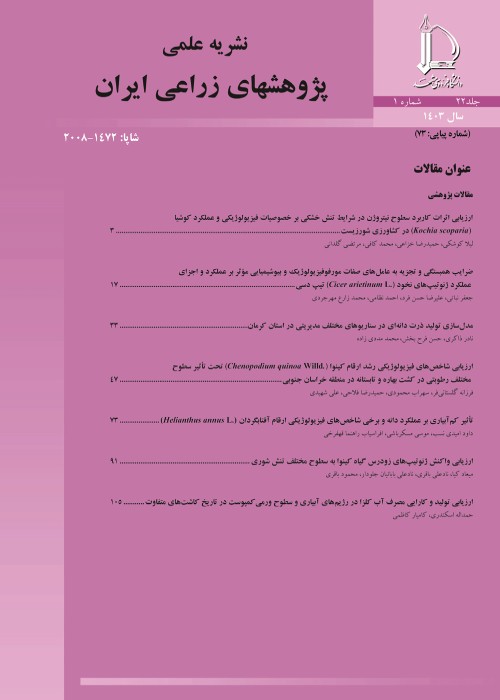Evaluation of the Effects of Drought Stress and Salicylic Acid on Growth and Physiological Parameters in Four Spring Canola Cultivars
Author(s):
Article Type:
Research/Original Article (دارای رتبه معتبر)
Abstract:
Introduction
Oilseed canola plant (Brassica napus L.) is an important agricultural crop grown primarily for its edible oil. It is well known that abiotic stresses especially drought stress are very restrictive factors for agricultural production around the world. Drought stress affects a vast range of morphological, physiological and biochemical characteristics in plants. However, exogenous application of materials such as salicylic acid (SA) has been regarded as a good alternative to counter the adverse effects of various environmental stresses on plant functions. Salicylic acid is a naturally occurring plant hormone that controls plant growth and induces water deficit tolerance in plants.Material and
Methods
The experiment was carried out as a split split plot layout with three replications in East Azarbaijan Research Center for Agriculture and Natural Resources. Treatments included three level of drought stress (well-watered, drought stress at flowering and podding stages) (as main plot), two level of SA spraying (0 and 150 ppm) (as sub plot) and four cultivars of spring canola (Zafar, Zarfam, Dalgan and RGS003) (as sub-sub plot). The studied traits were included number of pods, number of seeds per pod, 1000 seed weight, grain yield, chlorophyll a, b and total, carotenoid, H2O2, MDA, proline, total sugar contents and seed oil percentage. The collected data were analyzed using SAS 9.1 software and means were compared with Duncan test at the 5% and 1% level of probability using MSTATC software.
Results and Discussion
Results indicated that withholding irrigation from flowering stage had a more negative effect on yield components and physiological traits compared to withholding irrigation from podding stage. Withholding irrigation in both stages reduced the content of chlorophyll a, b and total and increased the content of H2O2 and MDA. Also, Zarfam and RGS003 cultivars had the highest content of chlorophyll and the lowest content of H2O2 and MDA. Salicylic acid (SA) spraying increased 31.79%, 41.1% and 7.33% of proline content, leaf soluble carbohydrate and seed oil, and decreased the content of MDA and H2O2 by 16.1% and 18.67% respectively. The results also showed that SA spraying led to 31.96% increase in grain yield under drought stress from podding stage. SA may compensate the negative impacts of drought stress on plant yield and other parameters.
Conclusions
In general, in this experiment, the use of salicylic acid not only improved the morphological and physiological traits of the plant under drought stress, probably through the effect on the antioxidant system but also increased the yield and quality of the cultivarsKeywords:
Language:
Persian
Published:
Iranian Journal of Field Crops Research, Volume:16 Issue: 4, 2018
Pages:
807 to 819
magiran.com/p1904004
دانلود و مطالعه متن این مقاله با یکی از روشهای زیر امکان پذیر است:
اشتراک شخصی
با عضویت و پرداخت آنلاین حق اشتراک یکساله به مبلغ 1,390,000ريال میتوانید 70 عنوان مطلب دانلود کنید!
اشتراک سازمانی
به کتابخانه دانشگاه یا محل کار خود پیشنهاد کنید تا اشتراک سازمانی این پایگاه را برای دسترسی نامحدود همه کاربران به متن مطالب تهیه نمایند!
توجه!
- حق عضویت دریافتی صرف حمایت از نشریات عضو و نگهداری، تکمیل و توسعه مگیران میشود.
- پرداخت حق اشتراک و دانلود مقالات اجازه بازنشر آن در سایر رسانههای چاپی و دیجیتال را به کاربر نمیدهد.
دسترسی سراسری کاربران دانشگاه پیام نور!
اعضای هیئت علمی و دانشجویان دانشگاه پیام نور در سراسر کشور، در صورت ثبت نام با ایمیل دانشگاهی، تا پایان فروردین ماه 1403 به مقالات سایت دسترسی خواهند داشت!
In order to view content subscription is required
Personal subscription
Subscribe magiran.com for 70 € euros via PayPal and download 70 articles during a year.
Organization subscription
Please contact us to subscribe your university or library for unlimited access!


